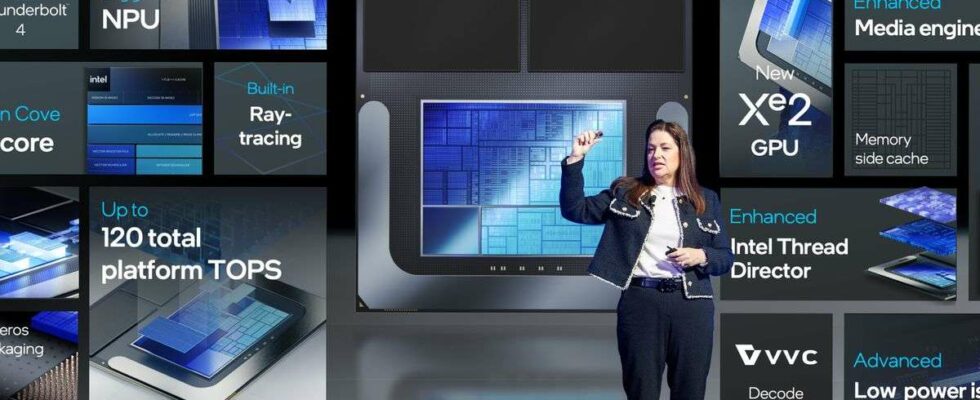Intel a décidé de renverser l’une de ses plus grandes réformes concernant les puces pour ordinateurs portables. La mémoire intégrée aux processeurs, présentée avec les Lunar Lake, sera abandonnée dans les générations futures, selon le PDG Pat Gelsinger. Ce changement est attribué à des problèmes financiers et à la dépendance excessive d’Intel vis-à-vis de partenaires externes pour les puces mémoire. De plus, des cartes graphiques dédiées pourraient également être éliminées, s’éloignant ainsi des initiatives de graphismes discrets de la société.
Intel is reversing one of its most significant adjustments to its laptop processors in years. Remember the recent Lunar Lake laptops that eliminated traditional memory sticks by integrating a fixed amount of RAM directly onto the processor package? Intel’s CEO, Pat Gelsinger, has now admitted that this strategy was a financial blunder, and the company will not pursue it again. Additionally, there are indications that desktop GPUs might be discontinued as well.
Upcoming Intel chip generations, like Panther Lake and Nova Lake, will feature separate memory. Gelsinger stated during Intel’s Q3 2024 earnings call, “It’s not a good way to run the business, so it really is for us a one-off with Lunar Lake.”
“We’ll adopt a more traditional design with off-package memory and keep the CPU and I/O capabilities integrated. However, our future roadmap will prioritize off-package memory,” he explained.
This shift may raise eyebrows, especially since Intel originally promoted Lunar Lake’s on-package memory as a major advantage for laptop battery life, claiming it could reduce data transfer power consumption by 40 percent.
During the earnings call, Gelsinger mentioned that Lunar Lake was intended as an experiment rather than being central to Intel’s laptop strategy:
“Lunar Lake was initially conceived as a niche product aimed at achieving the highest performance and exceptional battery life, but with the advent of AI PCs, it transformed from a niche offering to a high-volume product.”
Who doesn’t desire top-notch performance and battery longevity from laptops? However, Lunar Lake posed challenges for Intel due to heavy dependence on external vendors for memory chips from competitors like TSMC. In the previous quarter, amid significant layoffs and a restructuring announcement, Intel’s CFO indicated that Lunar Lake was too expensive to effectively improve the company’s financial performance. Although Gelsinger mentioned that Lunar Lake hasn’t reached 100 million units shipped, it did constitute “a meaningful portion of our total mix.”
Sadly for enthusiasts of PC graphics, it appears that Intel’s discrete GPU ambitions are also being viewed as an unsuccessful initiative. Gelsinger indicated a move towards simplifying consumer product offerings, placing dedicated graphics cards and chips at risk. He stated:
“How are we approaching graphics? We are increasingly focusing on large integrated graphics capabilities, reducing the need for discrete graphics moving forward.”
If Intel decides to discontinue standalone GPUs, it wouldn’t be unexpected—its foray into gaming graphics had only managed limited success with independent cards, primarily operating in the entry-level sector now increasingly challenged by AMD.
It would be disappointing if Intel never progresses beyond its initial attempt with Alchemist, leaving gamers eagerly anticipating the arrival of Intel’s Battlemage dGPUs without seeing a follow-up effort. At least Intel’s Arc graphics initiatives, including Battlemage, have made their way into the increasingly capable integrated graphics in its laptop processors.
—
Intel fait marche arrière sur l’un des changements les plus significatifs de ses puces pour ordinateurs portables depuis des années. Rappelez-vous des ordinateurs portables Lunar Lake de cet automne qui ont abandonné l’idée des barrettes de mémoire en intégrant une quantité fixe de RAM directement sur le paquet du processeur ? Le PDG d’Intel, Pat Gelsinger, a maintenant déclaré que cela s’est avéré être une erreur financière et qu’Intel ne le fera plus. De plus, il semble également envisager de supprimer les GPU de bureau.
Les futures générations de puces Intel, y compris Panther Lake et Nova Lake, n’intégreront pas de mémoire. “Ce n’est pas une bonne façon de diriger l’entreprise, donc pour nous, c’est vraiment un cas isolé avec Lunar Lake,” a déclaré Gelsinger lors de la conférence téléphonique sur les résultats du troisième trimestre 2024, comme l’a rapporté VideoCardz.
“Nous allons construire d’une manière plus traditionnelle avec de la mémoire hors package, et les capacités CPU et I/O dans le package. Mais la mémoire volumineuse sera hors package dans notre feuille de route à l’avenir, » a-t-il précisé.
Ce changement peut sembler déroutant, car Intel avait initialement présenté la mémoire intégrée de Lunar Lake comme un atout concurrentiel en matière de durée de vie de la batterie des ordinateurs portables, en vantant une réduction de 40 % de la consommation d’énergie pour le transfert de données à travers le système.
Cependant, lors de la conférence téléphonique, Gelsinger a suggéré que Lunar Lake était supposé être plus un essai qu
